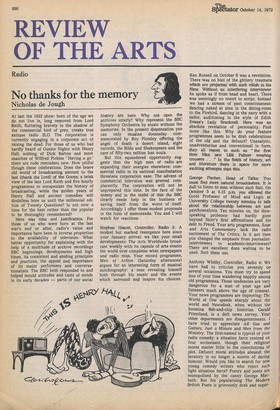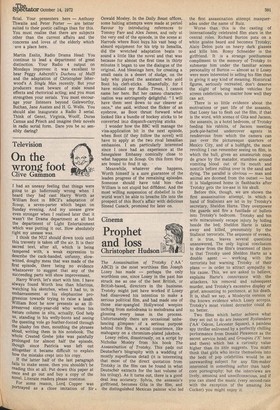REVIEW OF THE ARTS
Radio
No thanks for the memory
Nicholas de Jough
At last the 1922 show: born of the age we do not live in, long removed from Lord Reith, fluttering bravely in the shadow of the commercial bird of prey, creaks true antique radio 2L0. The corporation is currently engaging in a corporate act of raising the dead. For those of us who had hardly heard of Guests Nights with Henry Hall, nothing of Dick Barton and mere snatches of Wilfred Pickles 'Having a go' there are rude reminders now. How pitiful though these celebrations. Does the brave old world of broadcasting amount to the last (thank the Lord) of the Goons; a brisk view of the late Lord Reith and five hourly programmes to encapsulate the history of broadcasting, while the golden years of Henry Hall and ancient comedies will doubtless bore us until the millennial edition of Twenty Questions? Is not now a time for the best rather than the popular to be thoroughly remembered?
Here was time and justification. For those of us who were born at the last war's end or after, radio's value and importance have been in inverse proportion to the availability of television. What better opportunity for explaining with the help of a multitude of archive recordings BBC beginnings, developments and high times, its consistent and abiding principles and practices, the appeal and, importance of its major performers and conversationalists. The BBC both responded to and helped mould attitudes and casts of minds in its early decades — parts of our social history are here. Why not open the archives utterly? Why represent the BBC Symphony Orchestra by music without the memories. In the present dispensation you can only imagine doomsday commemorated by Roy Plomley offering the angel of death a desert island, eight records, the Bible and Shakespeare and the care of fifty-two million lost souls.
But this squandered opportunity suggests that the high men of radio are expanding their energies elsewhere: commercial radio in its national manifestation threatens corporation ease. The advent of commercial television was greeted complacently. The corporation will not be unprepared this time. In the face of the enemy and in the midst of this the BBC clearly needs help in the business of saving itself from the worst of itself. Accordingly I offer these modest proposals in the form of memoranda. You and I will watch for reactions.
Stephen Hearst, Controller, Radio 3: A mod,est but marked resurgence here since your January arrival: we like your small developments: The Arts Worldwide broadcast weekly with its capsule of arts events the world over completes what newspapers and radio miss. Your record programme, Men of Action (Saturday afternoons) argues for an interesting form of musical autobiography: a man revealing himself both through his music and the events which surround anci inspire his choices. Ken Russell on October 6 was a revelation. There was no hint of the glittery traumata which are projected with such relish in his films, Without an interfering interviewer he spoke as if from head and heart. There was seemingly no resort to script. Instead we had a stream of past consciousness: dancing naked at nine in the dining-room to the Firebird, dancing in the navy with a sailor, auditioning in the style of Edith Evans's Lady Bracknell. Here was an absolute revelation of personality. Find more like this. Why do your feature programmes seem to be drab celebrations of the old and the defunct? Unanalytic, unadventurous and conventional in form, they all resort to such as "the first time Max saw MI Palmer wearing trousers . . ." In the fields of history, art and literature there is space for more milting attempts than this.
George Fischer, Heed of Talks: You must find more natural broadCasters. It is dull to listen to men without such flair. On October 5 at 8.15 p.m. you allOwed the Grote Professor of Mind and Logic at University College twenty minutes to talk about the relationship between art and psychoanalysis. Ten minutes on, the slowspeaking professor had hardly gone beyond Storr's first affirmations and his debt to Freud. Your arts programmes, Scan and Arts Commentary lack the radio excitement of The Critics. Is it not time you changed the emphasis from journalistinterviewers to academic-interviewers? There are excellent dons waiting to be used. Sort them out.
Anthony Whitby, Controller, Radio 4: We have had, to criticise you severely on several occasions. You must try to spend less of your time wandering happily among old programmes. These tendencies are very dangerous for a man of your age and listeners much above the age of consent. Your news programmes are improving: Thc World at One speeds sharply about the world and Newsdesk, when without the booming fish-and-chip historian Gerald Priestland, is a deft news survey. Your other departments are disappointments. I have tried to appreciate An Gas and Gaiters, Just a Minute and Men from the Ministry. The first-named is typical of your radio comedy: a situation farce centred on four ecclesiasts, though their religious mores matter little to the convolutions of plot. Defunct moral attitudes abound: the lavatory is no longer a source of daring humour. Would you like to search for new young comedy writers who reject such light situation farce? 'Poetry and poets are monopolised by the canny George Macbeth. But his popularising The Modern British Poets is grievously drab and super
ficial. Your presenters here — Anthony Thwaite and Peter Porter — are better suited to their poetic callings than for this. You must realise that there are subjects other than the current affairs and the concerns and loves of the elderly which 'aye a place here.
Martin Esslin, Radio Drama Head: You continue to lead a department of great distinction. Your Radio 4 output on Mondays improves: it was excellent to hear Peggy Ashcroft's Duchess of Malfi and the adaptation of Christopher Isherwood's A Single Man recently. But your producers must beware of stale sound effects and rhetorical acting; and you must strengthen your serials. You must encourage your listeners beyond Galsworthy, Buthan, Jane Austen and H. G. Wells. You should also inaugurate a Radio 3 serial. Think of Genet, Virginia, Woolf, Duras Camus and Frisch and imagine their novels in radio serial form. Dare you be so sensibly daring?















































 Previous page
Previous page